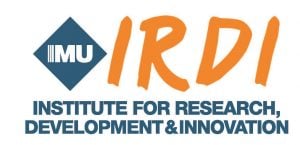Je Chin Ying had a special interest in clinical pharmacy and especially in evidence based pharmacotherapy. In order to learn more about this, she enrolled herself into the IMU Master of Pharmacy Practice (MPP) programme in 2017 as a fresh pharmacy graduate before starting her PRP training. She has since graduated from the MPP programme and is now a Provisionally Registered Pharmacist (PRP) with the Ministry of Health Malaysia. The clinical pharmacy stream of the MPP provides training in pharmaceutical care and care planning. This is experienced using patient case studies, and is overseen by both IMU and on-site (hospital pharmacist) clinical preceptors. This training helps extend and deepen knowledge of pharmacotherapeutics, clinical reasoning and communication skills. Apart from pharmacotherapeutics and evidence based pharmacotherapy, MPP students have the opportunity to understand principles of pharmacoepidemiology and pharmacovigilance; and health, wellness and disease prevention.
“I learnt to apply evidence-based pharmacotherapy practice to my work. I felt that this programme encouraged me and prepared me to be a better pharmacist in assisting the current medical practice. I appreciate the lecturers for their support and motivation. They also encouraged me to learn more. I learnt to apply the evidence-based pharmacotherapy practice for my work. I chose IMU because the Master of Pharmacy Practice programme is from IMU, which is well-renowned for its education quality for healthcare professionals.”
As part of the MPP programme, Je undertook a research study, learning how identify and write a well formulated research question, construct a rigorous research proposal, defend it at an institutional review board, collect and interpret original data. She received training on how to select research methods that would address her research question. As part of this, she received training in undertaking a systematic review using Cochrane methodology.  Je used the Programme research requirement to extend what she had learned from the taught modules, looking at evidence based medicine in cerebrovascular disease. Her study focussed on the efficacy and safety of treatments for the secondary prevention of stroke. In carrying out the study, she worked with IMU specialists and with cardiology pharmacists. Her research project was fully supported by IMU’s Institute of Research, Development and Innovation (IRDI). Je is currently condensing and re-casting her dissertation into a format suitable for scientific publication as all IMU students are encouraged to publish their research findings, and their supervisors fully support their efforts to review, write and publish. It can be seen that the IMU Master of Pharmacy Practice programme is an excellent avenue for individuals to undertake formal continuing professional development, expand and develop their skill sets, and their marketability. Je has utilised these opportunities from the programme to gain useful knowledge and develop useful skills that enable her to be a more effective practitioner, particularly in promoting the rational use of medicines.
Je used the Programme research requirement to extend what she had learned from the taught modules, looking at evidence based medicine in cerebrovascular disease. Her study focussed on the efficacy and safety of treatments for the secondary prevention of stroke. In carrying out the study, she worked with IMU specialists and with cardiology pharmacists. Her research project was fully supported by IMU’s Institute of Research, Development and Innovation (IRDI). Je is currently condensing and re-casting her dissertation into a format suitable for scientific publication as all IMU students are encouraged to publish their research findings, and their supervisors fully support their efforts to review, write and publish. It can be seen that the IMU Master of Pharmacy Practice programme is an excellent avenue for individuals to undertake formal continuing professional development, expand and develop their skill sets, and their marketability. Je has utilised these opportunities from the programme to gain useful knowledge and develop useful skills that enable her to be a more effective practitioner, particularly in promoting the rational use of medicines.









